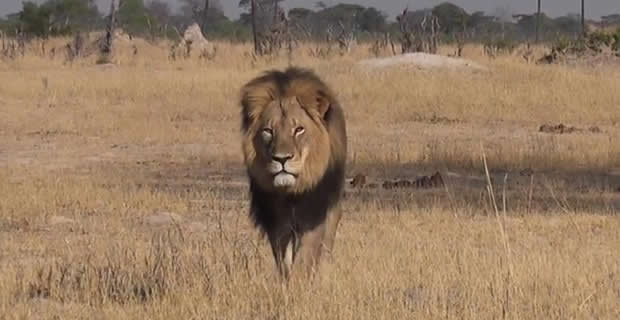Global wrath over Cecil’s slaughter

Sifelani Tsiko
Zimbabwe is this week a clear new leader at the top of media charts after the killing of Cecil, one of the oldest and most famous lions in Zimbabwe, by an American hunter, drew global condemnation and attracted international media attention. The killing of the lion by Walter James Palmer, an American dentist from Minnesota, who with assistance of guides, lured Cecil out of Hwange National Park using a bait before he shot it, set off widespread criticism on the mainstream international media putting the country under intense spotlight.
Cecil’s death attracted grim reviews in major newspapers, magazines, radio and television stations and online publications across the globe.
Animal lovers and activists condemned in the strongest terms the brutal killing of the lion, which had become a global tourism icon for Zimbabwe.
The social media was abuzz as animal rights activists hurled hateful rhetoric to elicit global condemnation of the killing of the lion which they described as an act of ‘brutality.’
The Cecil’s death set off intense debate over whether Zimbabwe should totally ban trophy hunting or continue in a controlled and well regulated manner.
Animal lovers were morally huffy about the killing of the lion and described it as ‘vicious and senseless bratality.”
Attacked some animal rights activists on Twitter: “You are a disgusting excuse of a human” and “when does hunting season starts, Walter Palmer?”
Some comments posted on Facebook were unkind and attacked Palmer with racially inflammable language: “This is one thing I despise about the Europeans; this beastly cancer about them of inflicting pain and calling it a thrill.
“They wiped out the Cape buffalo, they wiped out Eastern Cape rhino and elephant and they went as far as the Zambezi on their killing spree. Shame on them, no wonder there are only street squirrels in Europe.”
Other reports on CNN, BBC and other global media platforms gave penetrating analysis on the contentious issue of trophy hunting and its threats to Zimbabwe and Africa’s efforts to conserve wildlife.
Papers in the US and UK exposed Palmer as a big game hunter who was convicted for poaching by the federal court in Wisconsin in 2008.
Comments and opinions in the papers were harsh and coloured with vicious vocabulary used by animal rights campaigners. Palmer issued a statement admitting that he killed the lion with a bow and arrow, but said he regrets what he did and believed that his guides were leading him on a legal hunt.
Other commentators criticised the local media for being silent on the matter preferring to bury the story on the inside pages.
“What is actually fun is that we are learning of such issues from CNN. Where are our own journalists? commented Beauty Hwindizi on a Facebook post.
“Thanks to CNN. . . We could have not known we had such an amazing cat in Zimbabwe and that someone actually had the guts to come and kill it. Where are our news reporters when such crimes are being committed.
“I bet you if this information has landed on our local journalists they could not have reported it , they could have just put it aside as one of the cases of “refined culture of western tourism consumption.”
Other people were critical of the Western media’s interest on the matter and argued strongly that local communities close to the game park where the lion was killed were not benefiting anything from tourism.
“If the Western Press and pressure groups had not been outraged by this event, no one would have bothered about it because the Tonga whose land Cecil was roaming in never reaped any benefits from the tourist trade,” said one commentator in a post.
“They remain poor and destitute while the world now mourns Cecil. What a shame!”
Others steered clear of more controversial issues and paid tribute to the Zimbabwean Government for the arrests of Palmer and his guides.
“The mere fact that those behind the killing of the lion were arrested, shows the commitment of the Government in fighting poaching and illegal hunting activities in the country,” said an ex-parks and wildlife official.
“The Zimbabwe Government has been condemned harshly in the past, but the mere fact that the killing was perpetrated by an American opens a can of worms on the attitude of the Western media on Zimbabwe.”
Others attacked the animal rights activists for putting animals before humans.












Comments